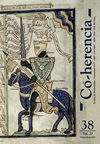Heraclitus and the Path to our Interior Aspect
Main Article Content
Keywords
Self-consciousness, Heraclitus, intimacy, logos, mind, presocratic philosophy
Abstract
There are elements in Heraclitus that are enticing to modern readers in that they point toward a certain intimacy of consciousness. Having read the fragments of this philosopher, we propose a reading that harmonizes his assertions about universality with his assertions about self-knowledge, in which we believe we can glimpse the discovery of self-awareness. In Heraclitus’ view, humans possess a soul with an unlimited horizon and a capacity to access the logos. A person must pursue introspection, listen to the logos, and find the unity of all things and himself. This will enable us to gain a deeper understanding of the interiority of self-awareness without sacrificing its connection to the universal. Furthermore, individuals must speak the logos to themselves to act according to it. By acting otherwise, one would be acting against his own inner self.
Downloads
References
Bernabé, A. (2004). Textos órficos y filosofía presocrática. Trotta.
Bernabé, A. (2013). Los filósofos presocráticos. Literatura, lengua y visión del mundo. Evohé.
Bernabé, A. (Ed. y Trad.). (2019). Fragmentos presocráticos. Abada.
Bernabé, A. (Ed.). (2008). Fragmentos presocráticos de Tales a Demócrito. Alianza.
Blondell, R. (1998). Reproducing Socrates: Dramatic Form and Pedagogy in the Theaetetus. Proceedings of the Boston Area Colloquium in Ancient Philosophy, 14, 213-238. https://doi.org/10.1163/2213441798X00162
Bremer, D., & Rechenauer, G. (Eds.). (2013). Frühgriechische Philosophie: Grundriss der Geschichte der Philosophie, vol. 1. Schwabe.
Brisson, L., Macé, A., & Therme, A.-L. (Eds.). (2012). Lire les présocratiques. PUF. https://doi.org/10.3917/puf.briss.2012.01
Casertano, G. (2009). I Presocratici. Carocci.
Colli, G. (Ed.). (1993-2006). La sapienza greca, 3 vols. Adelphi.
Curd, P. (2010). Colloquium 1: Thought and Body in Heraclitus and Anaxagoras. Proceedings of the Boston Area Colloquium in Ancient Philosophy, (25), 1-41. https://doi.org/10.1163/22134417-90000111
Curd, P. y Graham, D. W. (Eds.). (2008). The Oxford Handbook of Presocratic Philosophy. Oxford University Press. https://doi.org/10.1093/oxfordhb/9780195146875.001.0001
Diels, H. y Kranz, W. (1951-1975). Die Fragmente der Vorsokratiker. Weidmann.
Ferrer Gràcia, J. (Ed.). (2011). El pensament presocràtic. De Tales a Demòcrit. Fragments i testimonis. Ela Geminada.
García Calvo, A. (1999). Razón común. Edición crítica, ordenación, traducción y comentario de los restos del libro de Heráclito. Lucina.
Gardella, M. (2021). Heráclito de Éfeso, Cleobulina de Lindos y la tradición de los enigmas. Revista de Filosofía, 46(1), 45-62. https://dx.doi.org/10.5209/resf.75761
Gemelli Marciano, M. L. (Ed.). (2013). Die Vorsokratiker, 3 vols. Sammlung Tusculum.
Graham, D. H. (Ed.). (2010). The Texts of Early Greek Philosophy, 2 vols. Cambridge University Press.
Graham, D. W. (2008). Heraclitus: Flux, Order, and Knowledge. En P. Curd & D. W. Graham (Eds.), The Oxford Handbook of Presocratic Philosophy (pp. 169-188). Oxford University Press. https://doi.org/10.1093/oxfordhb/9780195146875.003.0006
Guthrie, W. K. C. (1984). Historia de la filosofía griega. Vol. 1. Los primeros presocráticos y los pitagóricos (A. Medina González, Trad.). Gredos.
Harry, C. C., & Habash, J. (Eds.). (2021). Brill’s Companion to the Reception of Presocratic Natural Philosophy in Later Classical Thought. Brill.
Igal, J. (Ed.). (2006). Plotino, Enéadas III-IV. Gredos. Jaeger, W. (1944). Paideia. Los ideales de la cultura griega (J. Xiral, Trad.). Fondo de Cultura Económica.
Kahn, C. H. (1979). The Art and Thought of Heraclitus: An Edition of the Fragments with Translation and Commentary. Cambridge University Press.
Kirk, G. S., Raven, J. E., & Schofield, M. (1983). The Presocratic Philosophers. A Critical History with a Selection of Texts. Cambridge University Press.
Laks, A. (2006). Introduction à la « philosophie présocratique ». PUF.
Laks, A., & Most, G. W. (Eds. y Trads.). (2016). Les débuts de la philosophie. Des premiers penseurs grecs à Socrate. Fayard. [Versión en inglés: Early Greek Philosophy, Harvard University Press]. Mansfeld, J., & Primavesi, O. (Eds.). (2011). Die Vorsokratiker. Reclam.
Marcovich, M. (1967). Heraclitus. Greek Text with a Short Commentary. Los Andes University Press.
Marcovich, M. (2001). Heraclitus. Greek Text with a Short Commentary. Academia.
McKirahan, R. D. (Ed.). (2010). Philosophy Before Socrates: An Introduction with Texts and Commentary. Hackett Publishing.
Morales Otal, C. y García López, J. (Trads.) (1986). Plutarco, Obras morales y de costumbres (Moralia II). Gredos.
Mouraviev, S. (1999-2012). Heraclitea. Édition critique complète des témoignages sur la vie et l’oeuvre d’Héraclite d’Éphèse et des vestiges de son livre, 11 vols. Academia.
Pòrtulas, J. y Grau, S. (Eds.). (2011). Saviesa grega arcaica. Adesiara.
Rapp, C. (2007). Vorsokratiker. Beck.
Reale, G. (1998). Platone: alla ricerca della sapienza segreta. Rizzoli.
Rechenauer, G. (Ed.). (2005). Frühgriechisches Denken. Vandenhoeck & Ruprecht.
Sassi, M. M. (2006). La costruzione del discorso filosofico nell’età dei presocratici. Scuola Normale Superiore.
Sassi, M. M. (2009). Gli inizi della filosofia in Grecia. Bollati Boringhieri.
Sokolowski, R. (2000). Introduction to Phenomenology. Cambridge University Press. https://doi.org/10.1017/CBO9780511809118
Torrijos-Castrillejo, D. (2014). Anaxágoras y su recepción en Aristóteles. EDUSC.
Torrijos-Castrillejo, D. (2018). La inteligencia (noesis) en Diógenes de Apolonia. Anuario filosófico, 51(3), 439-460. https://doi.org/10.15581/009.51.3.439-460
Warren, J. (2007). Presocratics. Acumen.
Warren, J., & Sheffield, F. (Eds.). (2014). Routledge Companion to Ancient Philosophy. Routledge. https://doi.org/10.4324/9781315871363





